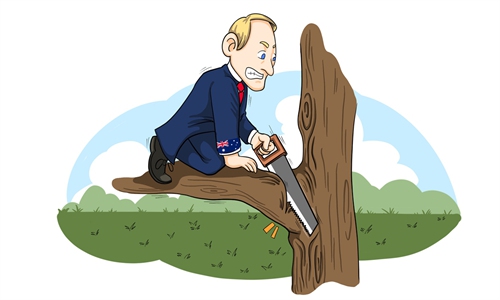
Illustration: Tang Tengfei/GT
Australia's largest communications provider Telstra Corp said on Monday it is considering buying mobile networks in six Pacific nations, which are currently owned by Jamaica-based telecom company Digicel Group, according to media reports.
The deal, which is still being negotiated, has attracted some attention as some see it as Australia's latest effort to limit Chinese influence in the region.
While such kind of Australian-style saber-rattling against China is not new, it is still a bit funny to see this kind of self-staged performance from time to time. China's economic strength far exceeds that of Australia's when it comes to investing in foreign infrastructure. If Chinese enterprises intend to make infrastructure investment in Pacific nations, what power on earth does Australia have to block China from investing in a third country? Can it compete with Chinese firms in terms of resources or a track record of delivery?
An unusual part of the Pacific network deal is that the Australian government will reportedly finance the bulk of the deal, while Telstra itself is not that interested in the telecom assets across the six nations. According to a Monday report by the Wall Street Journal, citing anonymous insider, Telstra "wouldn't have considered the Pacific acquisition without the government's request."
But the irony is that the Australian government's enthusiasm in the acquisition appears to have been fueled by the speculation that a Chinese company may purchase Digicel's Pacific unit. In fact, Digicel last year already denied the rumored report stating that "We can categorically state there is no basis to this whatsoever and that no approach has been made to us," according to Reuters.
Aside from Australia's reported motivation to invest in mobile networks in Papua New Guinea, Fiji, Nauru, Samoa, Vanuatu and Tonga, perhaps the more critical question for the six Pacific nations is whether the Australia operator has the capability and willingness to make necessary upgrades to the networks once the acquisition deal is done.
With more and more countries accessing 5G networks, Pacific nations also have a desire to upgrade their technology, and that means there will be more for the Australian company to invest in the telecom infrastructure. Last but not least, Pacific nations have their own right to attract and use foreign investment based on their own needs, which should by no means be subject to interference from politically motivated outside parties. Even though there is a long history of cooperation between Australia and Pacific nations, Australia should not take the region for granted.


